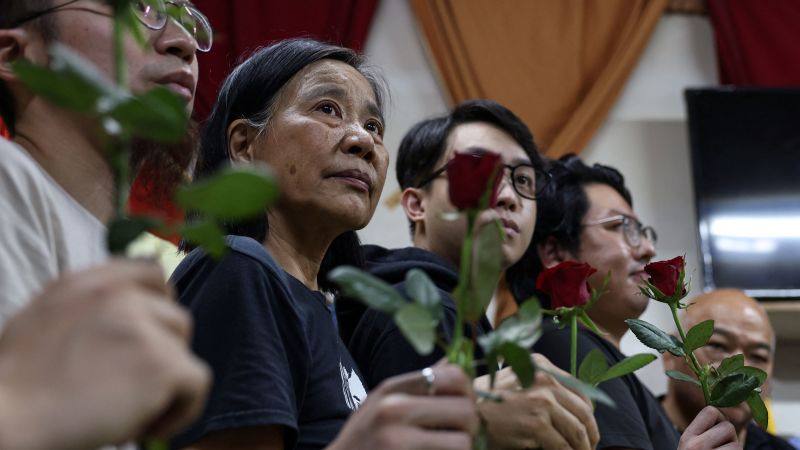
Hong Kong’s pro-democracy political party, the League of Social Democrats, announced its disbandment on Sunday, citing immense political pressure. This marks the latest setback in a prolonged crackdown that has significantly silenced the city’s once-vibrant opposition.
Following the massive anti-government protests of 2019, numerous leading activists faced prosecution or imprisonment under a national security law imposed by Beijing in 2020. Consequently, dozens of civil society groups have dissolved, and media outlets critical of the government have shut down.
The End of Street Protests
The League of Social Democrats was the last pro-democracy party that continued to stage small street protests and hold street booth activities, despite the associated risks. The party’s chairperson, Chan Po-ying, stated that the decision to disband was made after careful deliberation, taking into account the potential consequences for its members and allies.
Chan refrained from detailing the specific pressures faced but expressed pride in the party’s contributions to Hong Kong’s pro-democracy movement over recent years.
“We have stayed true to our original aspirations and haven’t let down the trust placed in us by those who went to prison,” she said. “While we are now forced to disband and feel an ache in our conscience, we have no other choice.”
Political Landscape Under Beijing’s Control
Hong Kong, a former British colony, is approaching the 28th anniversary of its return to Chinese rule on July 1. Historically, the city hosted annual pro-democracy protests on this day, along with other demonstrations demanding policy changes. However, these activities have ceased following the disbandment of organizing groups and the imprisonment of leading activists.
Critics argue that the drastic political changes under the security law illustrate the erosion of freedoms Beijing promised to maintain in 1997. The Beijing and Hong Kong governments, however, assert that the law is essential for the city’s stability. A Chinese official overseeing Hong Kong affairs in 2023 remarked that protests are not the only means for citizens to express their views, reflecting Beijing’s stance on demonstrations in the city.
Challenges Facing Pro-Democracy Parties
In April, Hong Kong’s largest pro-democracy party, the Democratic Party, also moved towards potential disbandment. Party veterans disclosed that some members were warned of repercussions if the party did not shut down, with a final vote anticipated at a later date.
Chan Po-ying expressed skepticism about the continuation of the “one country, two systems” principle, which Beijing uses to govern Hong Kong. She highlighted the imposition of the security law and the introduction of “soft resistance” as indicators of the principle’s demise.
“One country, two systems has already become one country, one system,” she stated.
A Legacy of Confrontational Activism
Founded in 2006, the League of Social Democrats was a left-wing political party known for opposing perceived collusion between government and business, advocating for public participation, and championing the interests of underprivileged residents. The party was renowned for its aggressive tactics in pursuit of change, including throwing bananas, eggs, and luncheon meat at officials or pro-Beijing lawmakers as protest gestures.
Despite advocating non-violent resistance, the party did not shy away from physical confrontations, distinguishing it from older, more traditional pro-democracy groups. The League once had three lawmakers in office, but its longest-serving lawmaker, Leung Kwok-hung, was disqualified from the legislature in 2017 due to his manner of taking the oath of office.
Continued Struggles and Future Prospects
The League’s activism led to the arrests and imprisonment of its members over the years. Notably, Leung and prominent LGBTQ+ activist Jimmy Sham, a former party leader, were sentenced to nearly seven years and over four years, respectively, for their roles in an unofficial primary election under the sweeping security law. Sham was released from prison last month.
In recent years, the party’s political influence dwindled, with no seats in the legislature or local district councils. Even basic financial services were withdrawn, as a bank ceased to provide account services to the group. Nevertheless, the League continued to stage small protests, despite the risk of arrest. On June 12, Chan and other members were fined after being found guilty of conducting street booth activities.
Despite their convictions, the League members persisted, protesting against the ruling outside the court. During Sunday’s press conference, Chan wiped away tears and chanted slogans with fellow members, acknowledging the challenges ahead.
“Moving forward is not at all easy,” she said. “I hope everyone can become like an ember, a flying spark – still carrying light, keeping that light alive, no matter how small it may be.”
The disbandment of the League of Social Democrats signals a significant shift in Hong Kong’s political landscape, raising questions about the future of pro-democracy activism in the city.






